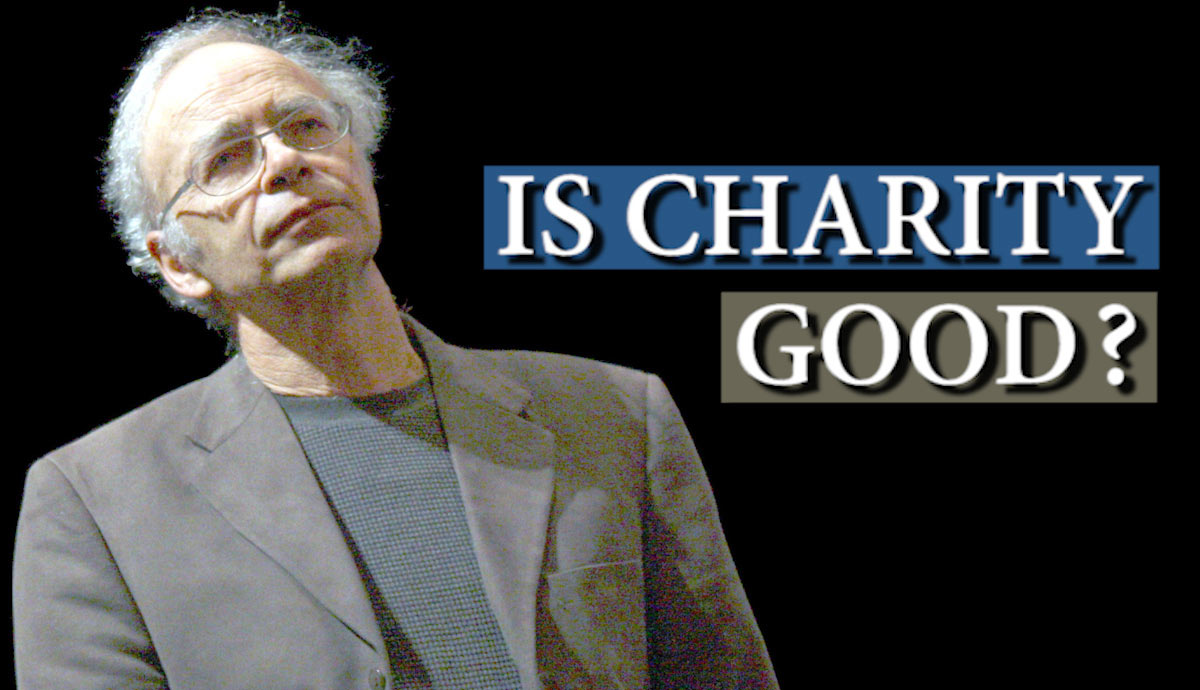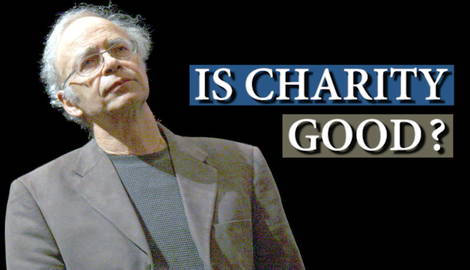
Peter Singer is perhaps the most famous currently living philosopher. His influence, both within the academy and beyond, is difficult to overstate. His 1975 book Animal Liberation is one of the foundational texts of the modern vegan movement and has inspired generations of activists. His work on utilitarianism (and all manner of other topics in ethical theory) put him at the forefront of the discipline. We will explore one of Singer’s most famous contributions to ethics: the argument for charity put forward in Famine, Affluence, and Morality.
The Background of Peter Singer’s Famine, Affluence, and Morality

One of Peter Singer’s most famous essays pertaining to ethics is Famine, Affluence, and Morality. The essay starts by describing the situation in Bangladesh in November 1971, shortly before the end of the Bangladesh Liberation War. The armed conflict with Pakistan forced millions of people to flee. By November 1971, many of them were destitute and dying due to a lack of food, shelter, and medical care.
This level of suffering, Singer argues, was avoidable. It was well within the capacity of richer nations “to give enough assistance to reduce any further suffering to very small proportions” (Singer, 1972, p. 229). Alas, we did not act. This was not the first time richer powers had failed to come to the aid of developing nations; and as we now know, it was not the last time either. The tragic fact is that poorer people around the world die every day due to inaction from those with the resources to help.
The purpose of Singer’s paper is to challenge this inaction by arguing that it is morally unjustifiable. Singer’s strategy is to build up an argument starting from what he takes to be uncontroversial premises. The first of these premises is that dying of starvation is bad; which is surely an uncontroversial assumption. The second is the act consequentialist view that “if it is within our power to prevent something bad from happening, without thereby sacrificing anything of comparable moral importance, we ought, morally, to do it” (Singer, 1972, p. 231).
Are You Morally Obligated to Save a Drowning Child?

At this point, Singer introduces a canonical example to illustrate why this second assumption is, indeed, uncontroversial:
“if I am walking past a shallow pond and see a child drowning in it, I ought to wade in and pull the child out. This will mean getting my clothes muddy, but this is insignificant, while the death of a child would presumably be a very bad thing”
(Singer, 1972, p. 231).
Surely, we would all agree that we have an obligation to save the drowning child. After all, we are right next to him. The principle, however, is more radical than that. The reason we must help the child has nothing to do with the fact they are close to us. It makes no difference, in Singer’s opinion, whether we are helping a drowning child or helping a stranger we will never meet, many thousands of miles away. Our moral obligations don’t depend on how far away we are from the problem. After all, if that were the case, one could simply isolate oneself from moral demands by running away; which is surely a perverse implication.

Neither do our moral obligations depend on whether other people are living up to theirs. Pointing to other people who also don’t give to charity does nothing to dissolve the argument that we, as individuals, ought to do so. Although it is true that if everyone gave, we (as individuals) would have to give less, that doesn’t mean we can simply avoid this obligation. We have an obligation to give as much as possible, so long as we don’t sacrifice something equally important in the process.
This leads to a radical implication: Giving to charities that help people avoid such dire fates as starvation or death is not a discretionary activity. Giving money to these organizations isn’t a sign of benevolent generosity, it is part of what we owe each other. In this sense, we should think of charitable giving in the same way as we think of paying taxes. In neither case are people going above and beyond, they are simply doing what is right.
The Demanding-ness Problem: How Big Are Our Obligations?

If what Peter Singer is saying is correct, this is a substantial demand. Contrary to popular opinion, we aren’t free to spend our money on, for example, newer, more fashionable clothes. Not being fashionable is nowhere near as important as not being dead. Therefore, we ought to continue to wear our old, unfashionable clothes, and give the money to charity. Not doing so is morally wrong.
At this point, one may object: isn’t this too demanding? If Singer is right, we all ought to be working full time on increasing the balance of happiness over misery. In Singer’s scheme, there is no room for personal preference. All personal pleasures will have to be strictly curtailed. No more leisurely walks in the park, no more sitting in the pub having a few beers. After all, you could be working in a soup kitchen, or spending that money on providing malaria nets.
Peter Singer bites the bullet here. Sure, the principle is demanding, and virtually everyone fails to live up to it. What is less clear to Singer is “why it should be regarded as a criticism of the position for which I have argued, rather than a criticism of our ordinary standards of behaviour” (Singer, 1972, p. 238). After all, no one said that being ethical was supposed to be easy.
Peter Singer and The Effective Altruism Movement

Unlike most philosophical arguments, Peter Singer’s plea for charity in Famine, Affluence, and Morality has had a real-world impact. Apparently, many people agree with Singer that the problem isn’t the demandingness of the argument. The problem is our failure to live up to these demands.
Through his foundation, The Life You Can Save, Singer has played an influential role in the rise of the effective altruism movement. Since the creation of Singer’s organization, a whole host of other similar organizations have sprung up, including Giving What We Can (which aims to charitable giving), 80.0000 hours (which helps people choose careers that have a high positive impact on wellbeing), and GiveWell (an organization aimed at finding the most effective charities). Effective altruist principles have also been influential on the giving practices of prominent philanthropists such as Bill Gates (through the Bill and Melinda Gates Foundation).

The effective altruism movement aims to put utilitarian thinking into practice. The goal is to do as much good as possible with the resources available to us. Giving to charity, while good, is not enough. The reason is that some charities are orders of magnitude more effective at increasing human well-being than others. Consider, for instance, donating a million dollars to a local art museum for the purchase of some expensive new paintings. Although this might increase well-being (people enjoy art and derive pleasure from it), much more well-being could have been generated if the money had, instead, been given to a charity that provides mosquito nets to help fight malaria.
Since 1972, however, Singer has become slightly more moderate in what he thinks we should ask of people. In his more recent work as part of the effective altruism movement, Singer is no longer arguing for people to devote all of their time and surplus resources to charity. Instead, his plea is for all of us who have enough to meet our basic needs (i.e. the overwhelming majority of people in the developed world) to give at least 10% of our income to charity. If this much more moderate and achievable demand were taken up universally, the consequences would be truly revolutionary.
Read More:
MacAskill, William (2022) What We Owe the Future. Basic Books, London.
MacAskill, William. (2015) Doing Good Better: Effective Altruism and a Radical way to Make a Difference. Faber, London.
Ord, Toby. (2020) The Precipice: Existential Risk and the Future of Humanity. Hachette Books, New York.
Singer, Peter. (1972) ‘Famine, Affluence, and Morality’ Philosophy & Public Affairs, Vol. 1, No. 3, pp. 229-243
Singer, Peter. (2011) Practical Ethics. Cambridge University Press, Cambridge.
Singer, Peter. (2009) The Life You Can Save: How to Do Your Part to End World Poverty. Princeton University Press, Princeton.
Singer, Peter. (2015) Animal Liberation. Penguin, London.
Singer, Peter. (2023) Animal Liberation Now. Penguin, London.










